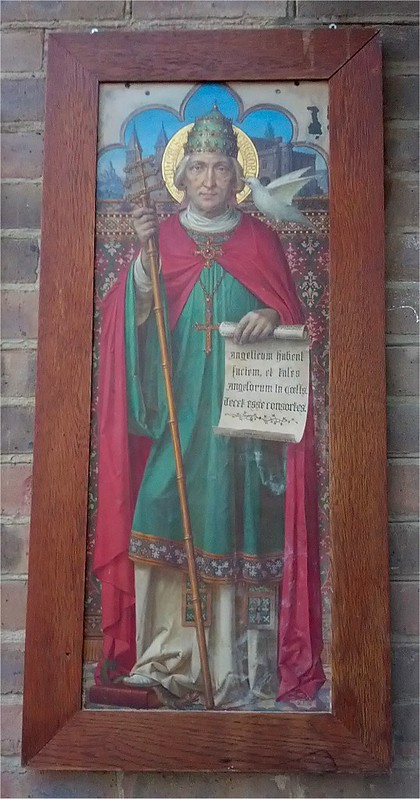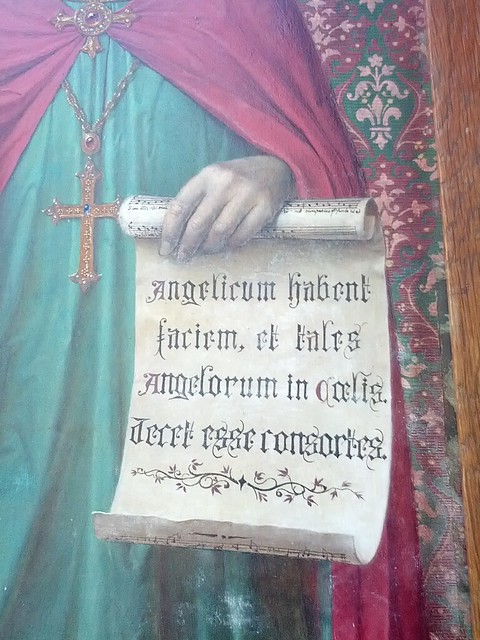St Gregory and the Angles

The Catholic primary school in my parish is called St Gregory's. In the reception area there is the above fine picture of their patron saint (also one of the principal patrons of the parish.)
Here is a close-up of the scroll which the saintly Pope is holding.

The scroll reads:
Angelicum habent faciem et tales angelorum in caelis decet esse consortesThe text is a quotation from St Bede's Ecclesiastical History of the English People, Book II, chapter I. This is often abbreviated into a simplified account in which St Gregory is supposed to have said "Not Angles but Angels." Here is the fulller version of the episode as related by St Bede:
They have an angelic face and it is fitting for such to be co-heirs of the angels in heaven.
Nor must we pass by in silence the story of the blessed Gregory, handed down to us by the tradition of our ancestors, which explains his earnest care for the salvation of our nation. It is said that one day, when some merchants had lately arrived at Rome, many things were exposed for sale in the market place, and much people resorted thither to buy: Gregory himself went with the rest, and saw among other wares some boys put up for sale, of fair complexion, with pleasing countenances, and very beautiful hair. When he beheld them, he asked, it is said, from what region or country they were brought? and was told, from the island of Britain, and that the inhabitants were like that in appearance. He again inquired whether those islanders were Christians, or still involved in the errors of paganism, and was informed that they were pagans. Then fetching a deep sigh from the bottom of his heart, “Alas! what pity,” said he, “that the author of darkness should own men of such fair countenances; and that with such grace of outward form, their minds should be void of inward grace.” He therefore again asked, what was the name of that nation? and was answered, that they were called Angles. “Right,” said he, “for they have an angelic face, and it is meet that such should be co-heirs with the Angels in heaven. What is the name of the province from which they are brought?” It was replied, that the natives of that province were called Deiri. “Truly are they De ira,” said he, “saved from wrath, and called to the mercy of Christ. How is the king of that province called?” They told him his name was Aelli and he, playing upon the name, said, “Allelujah, the praise of God the Creator must be sung in those parts.”In a whimsical touch, the scroll is presented as a palimpsest with musical notation on the reverse: Gregorian Chant, naturally.
Then he went to the bishop of the Roman Apostolic see (for he was not himself then made pope), and entreated him to send some ministers of the Word into Britain to the nation of the English, that it might be converted to Christ by them; declaring himself ready to carry out that work with the help of God, if the Apostolic Pope should think fit to have it done. But not being then able to perform this task, because, though the Pope was willing to grant his request, yet the citizens of Rome could not be brought to consent that he should depart so far from the city, as soon as he was himself made Pope, he carried out the long-desired work, sending, indeed, other preachers, but himself by his exhortations and prayers helping the preaching to bear fruit. This account, which we have received from a past generation, we have thought fit to insert in our Ecclesiastical History.